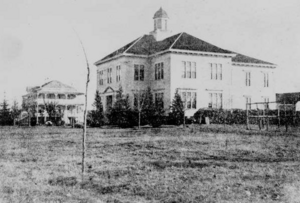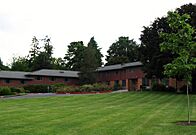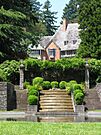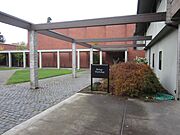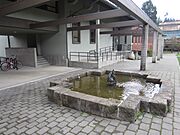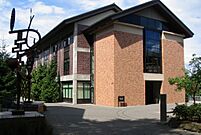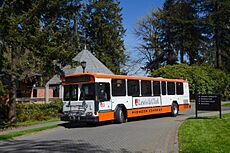- This page was last modified on 17 October 2025, at 10:18. Suggest an edit.
Lewis & Clark College facts for kids
This page is about the private college in Oregon. For the public college in Idaho, see Lewis–Clark State College. For the public community college in Illinois, see Lewis and Clark Community College.
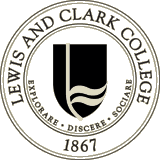 |
|
|
Former names
|
Albany Academy (1858–1866) Albany Collegiate Institute (1866–1867) Albany College (1867–1942) |
|---|---|
| Motto | Explorare, Discere, Sociare (Latin) |
|
Motto in English
|
To explore, to learn, to work together |
| Type | Private liberal arts college |
| Established | 1867 |
| Endowment | $322 million (2024) |
| President | Robin Holmes-Sullivan |
| Vice-president | David Reese |
|
Academic staff
|
414 (fall 2024) |
|
Administrative staff
|
165 (fall 2024) |
| Students | 3,462 (fall 2024) |
| Undergraduates | 2,139 (fall 2024) |
| Postgraduates | 1,323 (fall 2024) |
| Location |
,
,
United States
45°27′04″N 122°40′12″W / 45.451°N 122.670°W |
| Campus | Residential, 137 acres (0.55 km2), 137 acres (55 ha) |
| Colors | Orange and black |
| Nickname | Pioneers |
| Mascot | "Pio" the Newfoundland |
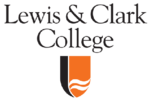 |
|
Lewis & Clark College is a private liberal arts college in Portland, Oregon. A liberal arts college is a school where students study a wide variety of subjects, like science, art, and history. The college was founded in 1867.
The college is located on a beautiful, historic piece of land called the M. Lloyd Frank Estate. It has three main parts: the College of Arts & Sciences for undergraduate students, a school for graduate students studying education and counseling, and a Law School.
The college's sports teams compete in the Division III of the National Collegiate Athletic Association.
Contents
History of the College
The school that became Lewis & Clark College started a long time ago. It was first created by Presbyterian pioneers who wanted to provide education in Oregon's Willamette Valley. In 1858, they opened a school called "Albany Academy."
A few years later, the school began to focus more on higher education. It changed its name to the "Albany Collegiate Institution" in 1866. The college officially considers 1867 its founding year, when it became "Albany College." From its very first graduating class in 1873, the college allowed both men and women to attend, which was unusual for that time.
The college was first located in the city of Albany. In 1934, it opened a smaller campus in Portland. By 1942, the whole school had moved to Portland. The leaders of the college bought a large estate called "Fir Acres" for the new campus. This is when the school was renamed Lewis & Clark College, after the famous explorers.
Campus Life and Buildings
Lewis & Clark's campus is very green and woodsy. It covers 137 acres on a hill called Palatine Hill in Portland. The campus is right next to a large state park, the Tryon Creek State Natural Area.
Some buildings on campus are very modern, while others are historic. The Frank Manor House is a beautiful mansion that is now the main administration building. Rogers Hall used to be a home for nuns before the college bought the land. Because of its beautiful setting and buildings, the campus has been named one of the most beautiful in America by several publications.
Living on Campus
Most students live on campus in dorms, called residence halls, for their first two years. This helps them get to know other students and become part of the college community. Most of the residence halls are co-ed, meaning both male and female students live in the same building.
Caring for the Environment
Lewis & Clark College works hard to be environmentally friendly. All of the college's electricity comes from wind power, which is a clean source of energy. When the college builds new buildings, they must be designed to be energy-efficient and sustainable.
The college also runs a shuttle bus called the Pioneer Express, or "Pio Express." This bus takes students between the campus and downtown Portland, which helps reduce car traffic.
Sports and Activities
The college's sports teams are called the Pioneers. Their colors are orange and black. Lewis & Clark has 10 men's and 11 women's varsity sports teams. They compete in the Northwest Conference against other colleges in the Pacific Northwest.
Many students also play in club sports, which are less formal than varsity teams. Sports like rugby and Ultimate Frisbee are very popular. In fact, the men's Ultimate Frisbee team, called "Bacchus," won the national championship in 2025.
Students at Lewis & Clark have even invented their own sports, like Ninja and Wolvetch. These games are a fun tradition at the college.
Notable People
Many well-known people have studied at or worked for Lewis & Clark College.
Famous Faculty and Staff
- William Stafford and Kim Stafford: A father and son who are both famous poets.
- John F. Callahan: A professor who was chosen to be in charge of the writings of the famous author Ralph Ellison after he died.
- Anthony Swofford: An author and professor who wrote a well-known book about his time as a Marine.
- Mary Szybist: A poet and professor who won a National Book Award for her work.
Famous Alumni
- Earl Blumenauer: A member of the U.S. Congress, representing a district in Oregon.
- Kate Brown: Served as the 38th governor of Oregon.
- Penn Badgley: A popular actor known for his roles in television shows.
- Ever Carradine: An actress who has appeared in many TV shows and movies.
- Markie Post: An actress best known for her role on the TV show Night Court.
- Monica Lewinsky: An activist who speaks out against bullying.
- Haben Girma: The first deaf-blind person to graduate from Harvard Law School, she is a lawyer who fights for the rights of people with disabilities.
- Genevieve Gorder: A television host and interior designer.
- Pete Ward: A former Major League Baseball player.

